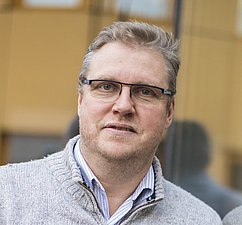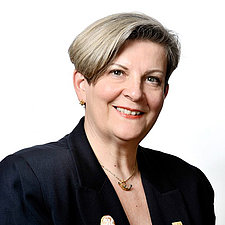Prof. Djamel Drider, UMRT 1158 BioEcoAgro, University of Lille, France
The bacteriocin DD14: a story to tell you

Dr Djamel Drider received a PhD in Food Science with emphasis in microbiology from the Ecole Nationale Supérieure Agronomique de Montpellier, France, and then he completed a postdoctoral position at the CIB-CSIC (Madrid, Spain) and Mount Sinai School of Medicine of New-York University (USA) where he received a training on mRNA stability in Gram-positive bacteria. Djamel joined ONIRIS-Nantes as Associate Professor in Microbiology and then he joined the University of Lille as Full-Professor in Microbiology. Djamel’s research is devoted to beneficial microorganisms, antimicrobial peptides namely bacteriocins for cognitive and applications purposes. Djamel has currently more than 155 published papers, 15 book chapters and 10 patents approved or pending.
Prof. Monica Höfte, Ghent University, Belgium
Unlocking the antimicrobial potential of cyclic lipopeptides produced by Pseudomonas spp.

Monica Höfte is a full professor at the Ghent University. She is the head of the laboratory of Phytopathology and chair of the Department of Plants and Crops. She is an agricultural engineer with a PhD degree in microbial ecology. Monica Höfte is a general plant pathologist with a wide interest in both fundamental and practical aspects of plant-pathogen interactions. Her research interests are biological and integrated control of plant pathogens, and natural and induced resistance mechanisms against fungi and bacteria in a wide variety of tropical (cocoyam, rice, banana) and temperate crops (lettuce, tomato, bean, cabbage, pepper, grapevine). The group has been working on soilborne pathogens such as Pythium, Fusarium, Verticillium and Rhizoctonia for many years. In the field of biocontrol, the focus is on cyclic lipopeptides produced by Pseudomonas and Bacillus strains.
Dr. Cyril Roblet, Innodal, France
The future of food safety is 100% natural.

After obtaining a PhD and a Post-Doc in Food Science at Laval University (Qc, Canada), specializing in the detection of bioactive molecules in complex food matrices, Cyril Roblet worked in the agri-food industry for over 8 years. Sometimes managing research projects in collaboration with North American universities, sometimes managing a plant, Cyril is now using his knowledge as Director of Partnerships at Innodal, an award-winning Quebec company specializing in the development of natural solutions for the elimination of bacteria directly on food products.
Dr. Philipe Gabant, Co-Founder-CSO, Syngulon, Belgium
Synthetic Biology applied to antimicrobial peptides a gateway for industrial applications

Philippe holds a PhD in Molecular Biology from the Université Libre de Bruxelles (ULB) obtained in 1993 and a Master in Management de l’Innovation from HEC Saint Louis (Brussels, Belgium) obtained in 1995. In 1995-1996 Philippe did a post-doctoral research at the University of Edinburgh (UK). During his research he discover using mouse model the function of the alpha-fetoprotein the major embryonic plasma protein in mammalian development. During his academic research career he was involved has an inventor in the development of a portfolio of genetic selection patented technologies. One of these technologies belonging to ULB was licensed to Life technologies and is on the market since 1995 it is today a standard in DNA assembly method: Gateway technology, TOPO cloning,…
Philippe Gabant is one of the founders of Delphi Genetics and the former CEO of the company (2001-2010) he has been in charge of the business development of the company from 2010 and June 2012. Philippe was involved in IP based business agreements including license negotiations and business alliances with major pharmaceutical companies including Sanofi-Pasteur, GSK and Merck.
Since 2013 Philippe is the founder and Scientific director of Syngulon a startup focusing on genetic innovations to improve the control of microbial population using bacteriocins (antimicrobial peptides). Philippe has established several partnerships for the company with academics and different industries on different markets.
Prof. Claire Le Hénaff, University of Bordeaux, Villenave-d'Ornon, France

Claire Le Hénaff-Le Marrec received a European PhD in cell biology with emphasis on food microbiology from the University of Rennes, and University Bielefeld. Her post-doctoral research was conducted at the University of Cork (UCC). Since 2011, she has served as a Full Professor of food microbiology at ENSMAC and at the Research Unit Oenology (UMR1366 INRAE University Bordeaux, Bordeaux INP).
Dr Le Hénaff-Le Marrec has longstanding expertise in LAB research and food fermentation science. Current projects focus on phage-host interactions in the lactic acid bacterium Oenococcus oeni, which performs the crucial role of MLF under regular winemaking conditions. She also develops phage-based solutions to control spoilers in alcoholic beverage.
Prof. Monique Lacroix, INRS - Armand-Frappier Santé Biotechnologie Research Centre, Canada
Stabilization of innovative antimicrobial biomolecules and food safety

Monique Lacroix has completed a B.Sc.A. and a M.Sc. in Food Sciences Technology in 1980 and 1982 respectively and a Ph.D. in Nutrition in 1986. She is full professor at INRS-Institute Armand-Frappier, Canada and director of the Research Laboratories in Sciences Applied to Food and of the Canadian Irradiation Centre. Prof. Lacroix is Fellow of the International Academy of Food Science and Technology (IAFoST) and of the Institute of Food Technologists (IFT) for her outstanding representatives of international food science and technology; she received 4 awards for her most cited publications in Food sciences and for the best 10 research partnership with industries for two partnerships.
Professor Lacroix has served as an expert member of several United Nations research networks on food safety and on nano biopolymer using gamma irradiation. She is also member of three Canadian networks: Canadian food processing networks, Research network on dairy products in Québec and of the Institute of nutraceuticals and functional foods.
Professor Lacroix is author of more than 365 publications, 10 patents and 34 book chapters. Until today, she has supervised 14 post-doct, 99 graduated students of 2nd and 3 th cycles and over than 350 trainees that come from all over the world. She has been invited to present over than 208 conferences in major congresses, including United Nations conferences as a member of expert committees.
Yann Maximilien, Deputy-Head of Biocide Efficacy Unit, ANSES, France

Deputy-Head of Biocide Efficacy Unit since 2019 in the Regulated Products Assessment Directorate (Anses).
Prof. Ismail Fliss, INAF, Laval University, Québec

A veterinarian by training, Dr. Fliss is a full professor and director of the Department of Food Science at Université Laval. After earning his doctorate in veterinary medicine in Tunis, Tunisia, he pursued a doctorate in food science and technology at Université Laval. In 1998, he completed a postdoctoral fellowship at the Canadian Food Inspection Agency in Ottawa.
Dr. Fliss is internationally recognized for his work on the identification, purification, and exploitation of bacteriocins from lactic and environmental bacteria as a new generation of natural antimicrobials for the food, medical, and veterinary sectors. He has published nearly 200 scientific articles in highly prestigious peer-reviewed journals, 10 book chapters, and holds 7 patents. He recently developed a database (Bactibase) on bacteriocins and proposed a new classification of these naturally occurring antimicrobial molecules. Two of his inventions have led to commercial products, notably BAC 35, a new additive for preserving marine products.
Prof. Sylvain Moineau, Laval University, Québec
Phages as friends and enemies in foods

Sylvain Moineau is a Professor of Microbiology in the Department of Biochemistry, Microbiology, and Bioinformatics of the Faculty of Sciences and Engineering at the Université Laval (Québec, Canada) since 1996. He obtained a PhD in Food Sciences in 1993 and did a postdoctoral fellow at Quest International (a division of Unilever at the time) in the USA. He has published close to 300 articles and book chapters. He is among the most cited microbiologists for the last decade.
His research group studies phage biology and phage-bacteria interactions. Phages can be both friends and foes. Foes because they can destroy bacteria that play key roles in food fermentations. His group studies phage resistance mechanisms such as CRISPR-Cas systems to develop phage-resistant bacteria for food applications. Phages can also be friends since they can suppress pathogenic bacteria. He is developing strategies to use phages as biocontrol or therapeutic agents in various industrial sectors and public health. He holds the Canada Research Chair in Bacteriophages since 2011 and is the Curator of the Félix d’Hérelle Reference Center for Bacterial Viruses since 2003.
He was awarded several academic prizes including the Killiam Prize, NSERC Polanyi Award, Canadian Society for Microbiologists Career Award, Prix Marie Victorin, and Flavelle Medal. He was also awarded industry prizes including the NSERC Synergy Award (Canada), DuPont Excellence Medal (Denmark), European LABIP International Science Award, and ADSA Food Specialties Award (USA) as well as civil recognitions (Officer of the Order of Canada, Officer of the National Order of Quebec).